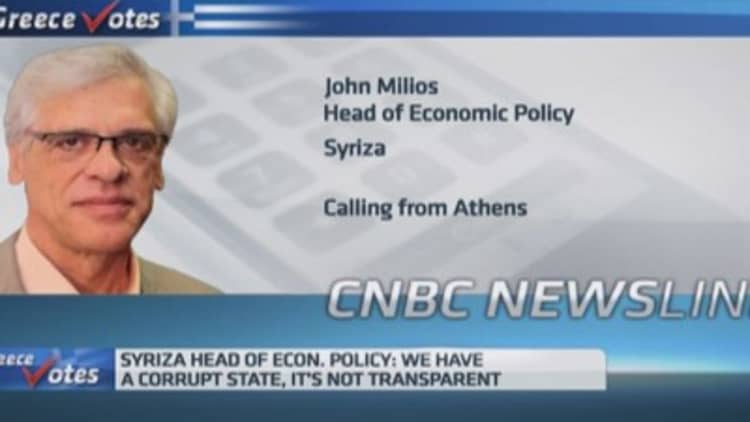
Accusations that Greece's far-left opposition party Syriza is "worse than communism" are propaganda, its head of economic policy insisted on Tuesday, arguing instead that the party would solve Greece's "humanitarian crisis" if it came to power in January.
Speaking to CNBC on Tuesday, John Milios said Syriza planned to stabilize Greece's society and boost the economy.
"We have to combat first the humanitarian crisis, people who don't have the necessities -- houses, food or the money for transportation," he said. "We are confident that if we do this the economy will start to stabilize and the present turmoil will be past."
Greece's political establishment was thrown into chaos on Monday, when its parliament's failure to elect a president triggered an early general election – something that credit ratings agency Fitch warned on Tuesday would increase the risks to the country's credit worthiness.
Anti-austerity Syriza appears confident that it can win the forthcoming election in January, however. Opinion polls released late on Monday showed Syriza had a three percentage point lead over Prime Minister Antonis Samaras' party, although the lead has narrowed of late.
'Worse than communism'
But although attractive to voters, the party does not appear to be popular within the investment community.
In November, an email written by Joerg Sponer, an investment analyst at Capital Group, was leaked in which he said Syriza's policies were "worse than communism." Sponer reportedly wrote the email after attending a conference in London in which Milios presented the party's economic manifesto.
But Milios was quick to defend his policies, saying that such comments were "government propaganda."
"This saying that we are worse than communists was not something that represented the whole climate of discussions in London. I think this… had to do with the present government and to do with propaganda," he told CNBC Europe's "Squawk Box" on Tuesday.
Investor concerns
Investors are particularly concerned that a Syriza-led government could result in the undoing of the austerity policies implemented under Samaras' present government. The party has always said it would "tear up" the tough conditions of Greece's bailout, which were required by the troika of international creditors, the European Union, International Monetary Fund (IMF) and European Central Bank (ECB).
The Athens stock exchange fell up to 10 percent on Monday, before paring some losses, and was trading 0.3 percent lower on Tuesday. Meanwhile, Greece's borrowing costs remained above 9.5 percent.
Read MoreGreek stocks tank assnap election called
With a public debt to GDP ratio of 175.5 percent, the country has the highest debt in the euro zone, but Greece's politicians are keen to calm European lenders that Greece isn't about to default – or leave the single currency union.
Syriza's leader, Alexis Tsipras, said the onerous terms of the bailout would be "overturned" if the party got into power, but insisted the country would honor its debt obligation, Reuters reported.
"We want to show our European partners that this debt has to be restructured," Milios added. "It's not possible to create enormous primary surpluses just to pay for a debt which cannot be serviced. It's not only Greece in this situation, we have to open it as a European problem and find a solution."
Milios said Syriza's main aims were to clean up the country's "corrupt" state. He added that combating tax evasion would help create new revenues for the government and attract foreign investment.
Beware the Syriza 'experiment'
Not everyone is convinced by this last point, however. Kyriakos Mitsotakis, minister of administrative reform and e-governance in the current Greek government, told CNBC Tuesday that foreign investors would not want to see Syriza in power.
"The Greek public faces a clear choice to continue with the path of growth and stability or whether it will 'experiment' and elect Syriza," he told CNBC's "Worldwide Exchange" on Tuesday.

"Syriza's rhetoric is anti-European and anti-business and we know that growth can only come from the private sector."
Read MoreWhy Greece is not the risk it once was
He insisted that Greek voters cannot have the best of both worlds – as promised by Syriza.
"We will be telling voters the truth, which is that you cannot… tear up the memorandum and still have funding. (It) is not realistic," Mitsotakis added.
- By CNBC's Holly Ellyatt, follow her on Twitter @HollyEllyatt. Follow us on Twitter: @CNBCWorld


